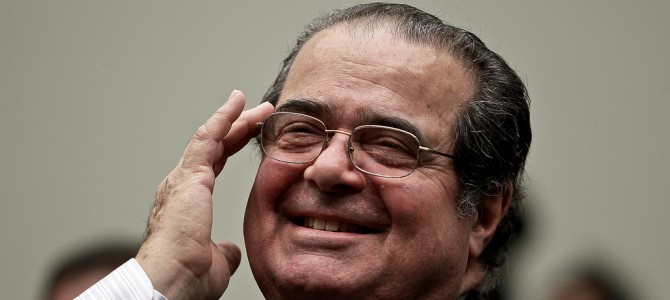Supreme Court Justice Antonin Scalia wrote what has to be some of the best reads in Supreme Court history. His dissents in particular were filled with his strong, witty, and punny personality. Here are 15 of my personal favorites.
From his dissent of the ObamaCare case:
1. “The Court’s next bit of interpretive jiggery-pokery involves other parts of the Act that purportedly presuppose the availability of tax credits on both federal and state Exchanges.”
2. “Words no longer have meaning if an Exchange that is not established by a State is ‘established by the State.’”
3. “We should start calling this law SCOTUScare.”
4. “Pure applesauce. Imagine that a university sends around a bulletin reminding every professor to take the ‘interests of graduate students’ into account when setting office hours, but that some professors teach only undergraduates. Would anybody reason that the bulletin implicitly presupposes that every professor has ‘graduate students,’ so that ‘graduate students’ must really mean ‘graduate or undergraduate students’? Surely not.”
5. “Context always matters. Let us not forget, however, why context matters: It is a tool for understanding the terms of the law, not an excuse for rewriting them.”
6. “The somersaults of statutory interpretation they have performed … will be cited by litigants endlessly, to the confusion of honest jurisprudence.”
Great pieces of wisdom from his 35 years on the Supreme Court:
7. “In law school, I never understood [antitrust law]. I later found out, in reading the writings of those who now do understand it, that I should not have understood it because it did not make any sense then.” (1986) Supreme Court confirmation hearing.
8. “Campaign promises are, by long democratic tradition, the least binding form of human commitment.” (2002) Republican Party v. White.
9. “The point at which life becomes ‘worthless,’ and the point at which the means necessary to preserve it become ‘extraordinary’ or ‘inappropriate,’ are neither set forth in the Constitution nor known to the nine Justices of this Court any better than they are known to nine people picked at random from the Kansas City telephone directory….” On the court’s lack of authority regarding the right to die, (1990) Cruzan v. Missouri Department of Health.
10. “People look at rights as if they were muscles — the more you exercise them, the better they get.” (2003) Speech at the University of Chicago Law School.
11. “The operation was a success, but the patient died.’ What such a procedure is to medicine, the Court’s opinion in this case is to law.” (1998) National Endowment for the Arts v. Finley.
12. “Have the courage to have your wisdom regarded as stupidity.” (2005) Address to the Knights of Columbus Council 969 in Baton Rouge, Louisiana.
13. “You could fire a grapeshot out of a cannon over the best law schools in the country — and that includes Chicago — and not hit an originalist.” (2003) Speech at University of Chicago Law School.
14. “I am sure that the Framers of the Constitution, aware of the 1457 edict of King James II of Scotland prohibiting golf because it interfered with the practice of archery, fully expected that sooner or later the paths of golf and government, the law and the links, would once again cross, and that the judges of this august Court would some day have to wrestle with that age-old jurisprudential question, for which their years of study in the law have so well prepared them: Is someone riding around a golf course from shot to shot really a golfer? The answer, we learn, is yes. The Court ultimately concludes, and it will henceforth be the Law of the Land, that walking is not a fundamental aspect of golf.” (2001) PGA Tour, Inc. v. Martin.
15. “I find it a sufficient embarrassment that our Establishment Clause jurisprudence regarding holiday displays has come to require scrutiny more commonly associated with interior decorators than with the judiciary.” (1992) Lee v. Weisman.








